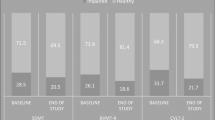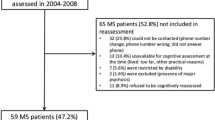Abstract
Little is known about neuropsychological status changes in multiple sclerosis (MS) patients experiencing a relapse. The Symbol Digit Modalities Test (SDMT) and MS Neuropsychological Screening Questionnaire (MSNQ) are brief measures of cognitive performance and self-reported status, respectively. We retrospectively identified relapses in subjects participating in the 48-week open-label, safety-extension study of natalizumab (STRATA) to determine if changes in cognitive ability occurred during acute relapses. SDMT and MSNQ were administered prior to infusions. We analyzed SDMT and MSNQ scores pre- and post-relapse in 53 MS patients with relapses (cases) and 115 MS patients without relapses (controls) matched on age, gender, baseline SDMT and time from study initiation. ANOVA and GLM were used to compare cases versus controls overall, and stratified by EDSS cerebral functional status (cFS) scores. SDMT change pre- to post-relapse in cases was significantly lower than difference between similar time points in controls (p = 0.003). When comparing visit 2 (two visits pre-relapse) to visit 1 (first visit post-relapse), MSNQ change was significantly different between cases and controls (p = 0.012). For cFS ≤ 1, the change in SDMT was significantly different between cases and controls but not for cFS ≥ 2. These results confirm the involvement of cognitive function during some MS relapses suggesting the SDMT or MSNQ can be used to identify transitory neuropsychological status changes and cognitive relapses.

Similar content being viewed by others
References
Lublin FD, Reingold SC (1996) Defining the clinical course of multiple sclerosis: results of an international survey. National Multiple Sclerosis Society (USA) Advisory Committee on Clinical Trials of New Agents in Multiple Sclerosis. Neurology 46:907–911 (see comment)
Rao SM, Leo GJ, Bernardin L, Unverzagt F (1991) Cognitive dysfunction in multiple sclerosis. I. Frequency, patterns, and prediction. Neurology 41:685–691
Feuillet L, Reuter F, Audoin B et al (2007) Early cognitive impairment in patients with clinically isolated syndrome suggestive of multiple sclerosis. Mult Scler 13:124–127
Smith A (1982) Symbol Digit Modalities Test. Manual. Western Psychological Services, Los Angeles
Benedict RHB, Cox D, Thompson LL, Foley FW, Weinstock-Guttman B, Munschauer F (2004) Reliable screening for neuropsychological impairment in MS. Mult Scler 10:675–678
Benedict RH, Duquin JA, Jurgensen S et al (2008) Repeated assessment of neuropsychological deficits in multiple sclerosis using the Symbol Digit Modalities Test and the MS Neuropsychological Screening Questionnaire. Mult Scler 14:940–946
Morrow SA, O’Connor PW, Polman CH, Goodman AD, Kappos L, Lublin FD, Rudick RA, Jurgensen S, Paes D, Forrestal F, Benedict RHB (2010) Evaluation of the Symbol Digit Modalities Test (SDMT) and MS Neuropsychological Screening Questionnaire (MSNQ) in Natalizumab treated MS patients over 48 weeks. Mult Scler 16(11):1385–1392
Kurtzke JF (1983) Rating neurologic impairment in multiple sclerosis: an expanded disability status scale (EDSS). Neurology 33:1444–1452
Rao SM (1990) A manual for the Brief Repeatable Battery of Neuropsychological Tests in Multiple Sclerosis. Medical College of Wisconscin, Milwaukee
Patti F, Pozzilli C, Montanari E et al (2007) Effects of education level and employment status on HRQoL in early relapsing-remitting multiple sclerosis. Mult Scler 13:783–791
Amato MP, Ponziani G, Rossi F, Liedl CL, Stefanile C, Rossi L (2001) Quality of life in multiple sclerosis: the impact of depression, fatigue and disability. Mult Scler 7:340–344
Benedict RHB, Wahlig E, Bakshi R et al (2005) Predicting quality of life in multiple sclerosis: accounting for physical disability, fatigue, cognition, mood disorder, personality, and behavior change. J Neurol Sci 231:29–34
Gronwall DM (1977) Paced auditory serial-addition task: a measure of recovery from concussion. Percept Mot Skills 44:367–373
Ozakbas S, Cagiran I, Ormeci B, Idiman E (2004) Correlations between multiple sclerosis functional composite, expanded disability status scale and health-related quality of life during and after treatment of relapses in patients with multiple sclerosis. J Neurol Sci 218:3–7
Patzold T, Schwengelbeck M, Ossege LM, Malin JP, Sindern E (2002) Changes of the MS functional composite and EDSS during and after treatment of relapses with methylprednisolone in patients with multiple sclerosis. Acta Neurol Scand 105:164–168
Barker-Collo SL (2005) Within session practice effects on the PASAT in clients with multiple sclerosis. Arch Clin Neuropsychol 20:145–152
Bever C, Grattan L, Panitch HS, Johnson KP (1995) The brief repeatable battery of neuropsychological tests for multiple sclerosis: a preliminary serial study. Mult Scler 1:165–169
Foong J, Rozewicz L, Quaghebeur G, Thompson AJ, Miller DH, Ron MA (1998) Neuropsychological deficits in multiple sclerosis after acute relapse. J Neurol Neurosurg Psychiatry 64:529–532
Feinstein A, Youl B, Ron M (1992) Acute optic neuritis. A cognitive and magnetic resonance imaging study. Brain 115(Pt 5):1403–1415
Deloire MS, Bonnet MC, Salort E et al (2006) How to detect cognitive dysfunction at early stages of multiple sclerosis? Mult Scler 12:445–452
Parmenter BA, Weinstock-Guttman B, Garg N, Munschauer F, Benedict RH (2007) Screening for cognitive impairment in multiple sclerosis using the Symbol Digit Modalities Test. Mult Scler 13:52–57
Benedict RHB, Cookfair D, Gavett R et al (2006) Validity of the Minimal Assessment of Cognitive Function in Multiple Sclerosis (MACFIMS). J Int Neuropsychol Soc 12:549–558
Strober L, Englert J, Munschauer F, Weinstock-Guttman B, Rao S, Benedict R (2009) Sensitivity of conventional memory tests in multiple sclerosis: comparing the Rao Brief Repeatable Neuropsychological Battery and the Minimal Assessment of Cognitive Function in MS. Mult Scler 15:1077–1084
Brochet B, Deloire MS, Bonnet M et al (2008) Should SDMT substitute for PASAT in MSFC? A 5-year longitudinal study. Mult Scler 14:1242–1249
Drake AS, Weinstock-Guttman B, Morrow SA, Hojnacki D, Munschauer FE, Benedict RH (2010) Psychometrics and normative data for the multiple sclerosis functional composite: replacing the PASAT with the Symbol Digit Modalities Test. Mult Scler 16:228–237
Smith MM, Arnett PA (2005) Factors related to employment status changes in individuals with multiple sclerosis. Mult Scler 11:602–609
Morrow SA, Drake A, Zivadinov R, Munschauer F, Weinstock-Guttman B, Benedict RHB (2010) Predicting loss of employment over three years in multiple sclerosis: clinically meaningful cognitive decline. The clinical neuropsychologist 24(7):1131–1145
Uttner I, Muller S, Zinser C et al (2005) Reversible impaired memory induced by pulsed methylprednisolone in patients with MS. Neurology 64:1971–1973
Brunner R, Schaefer D, Hess K, Parzer P, Resch F, Schwab S (2005) Effect of corticosteroids on short-term and long-term memory. Neurology 64:335–337
Benedict RHB, Munschauer FE, Linn R, Miller C, Foley FW, Jacobs LD (2003) Screening for multiple sclerosis cognitive impairment using a self-administered 15-item questionnaire. Mult Scler 9:95–101
Lyros E, Messinis L, Papageorgiou SG, Papathanasopoulos P (2010) Cognitive dysfunction in multiple sclerosis: the effect of pharmacological interventions. Int Rev Psychiatry;22:35–42
Acknowledgments
The authors would like to thank the STRATA patients, investigators and steering committee for their participation in this study.
Conflict of interest
None.
Author information
Authors and Affiliations
Corresponding author
Additional information
An erratum to this article can be found at http://dx.doi.org/10.1007/s00415-011-6020-2
Rights and permissions
About this article
Cite this article
Morrow, S.A., Jurgensen, S., Forrestal, F. et al. Effects of acute relapses on neuropsychological status in multiple sclerosis patients. J Neurol 258, 1603–1608 (2011). https://doi.org/10.1007/s00415-011-5975-3
Received:
Revised:
Accepted:
Published:
Issue Date:
DOI: https://doi.org/10.1007/s00415-011-5975-3




